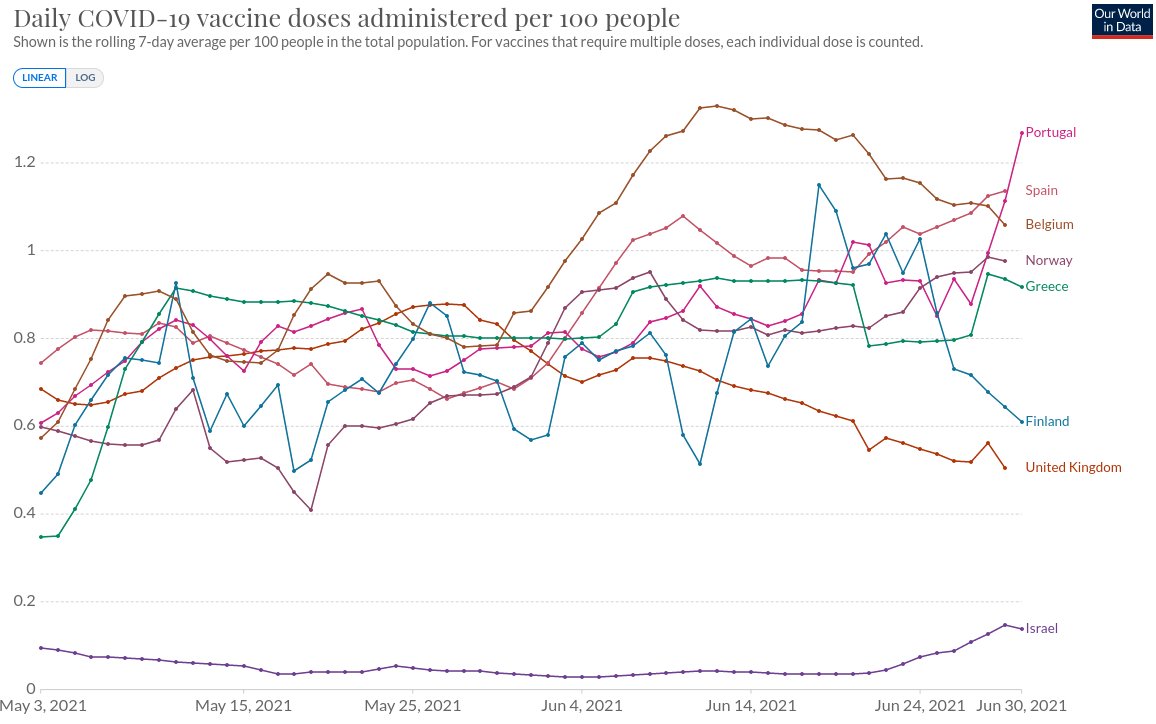
Lots going on in the charts today, in this period of calm before the brakes get lifted on the 19th.
The good news first: meagre growth to 32551 cases on a Thurday boosts the doubling time to 26,1 days.
The bad news: the death trend continues to rise further above the...

The good news first: meagre growth to 32551 cases on a Thurday boosts the doubling time to 26,1 days.
The bad news: the death trend continues to rise further above the...


... hospitalization trend, nearly keeping track with the case trend.
We finally got age breakdown data for June, and there is some good news: the growing incidence rate of childhood hospitalizations relative to cases has reversed and is back to winter levels. While it's not...
We finally got age breakdown data for June, and there is some good news: the growing incidence rate of childhood hospitalizations relative to cases has reversed and is back to winter levels. While it's not...
... clear why this has happened, it's certainly welcome.
Vaccination in June switched to primarily focusing on the 18-54yo cohort, and this can be clearly seen in their declining share of cases in graph 2. The 55+ cohort continued to decline as immunity built, but appears to...
Vaccination in June switched to primarily focusing on the 18-54yo cohort, and this can be clearly seen in their declining share of cases in graph 2. The 55+ cohort continued to decline as immunity built, but appears to...
... have largely leveled off; additional immunity in this cohort will probably only accumulate slowly.
120 doctors and researchers including a number of prominent names recently published a letter in the Lancet decrying the UK's "infect everyone" policy:
thelancet.com/journals/lance…
120 doctors and researchers including a number of prominent names recently published a letter in the Lancet decrying the UK's "infect everyone" policy:
thelancet.com/journals/lance…
Signatories here:
thelancet.com/cms/10.1016/S0…
A press conference was held, introduced and supported by the editor of The Lancet himself, Richard Horton. Video and summary...
thelancet.com/cms/10.1016/S0…
A press conference was held, introduced and supported by the editor of The Lancet himself, Richard Horton. Video and summary...
...here.
An interesting paper came out a few days ago on the topic of autoimmunity playing a role in Long COVID patients. Patients were followed from 5 months to 12 months, during which timeperiod only 22,9% of patients saw full remission of...
https://twitter.com/sstroschein2/status/1413061132273729536
An interesting paper came out a few days ago on the topic of autoimmunity playing a role in Long COVID patients. Patients were followed from 5 months to 12 months, during which timeperiod only 22,9% of patients saw full remission of...
... symptoms.
academic.oup.com/cid/advance-ar…
The patients were tested for antinuclear antibodies at the >160 titre. In the general population, about 5% exceed these thresholds, but in the study patients, 43,6% did, with the symptoms worse in those with high ANA levels.
It is not...
academic.oup.com/cid/advance-ar…
The patients were tested for antinuclear antibodies at the >160 titre. In the general population, about 5% exceed these thresholds, but in the study patients, 43,6% did, with the symptoms worse in those with high ANA levels.
It is not...
...news that COVID causes antiself antibodies, and in particular antinuclear antibodies - this has been well studied in relation to the acute phase of the disease. And indeed, concern had previously been raised that these may persist past the end of the acute phase. This...
... study shows that autoimmunity is a common problem in Long COVID patients post-infection.
In other news, I continue to be staggered at the rate of growth of Spain's "wall of COVID", with cases jumping from "nearly nothing" to "half the record peak" in just two weeks.
In other news, I continue to be staggered at the rate of growth of Spain's "wall of COVID", with cases jumping from "nearly nothing" to "half the record peak" in just two weeks.

Greece and the Netherlands likewise now look like they've driven straight into a wall.
Italy and Germany, the last two big holdouts, are both at 13% week-over-week case growth. France, the previous holdout, is up to 49%.

Italy and Germany, the last two big holdouts, are both at 13% week-over-week case growth. France, the previous holdout, is up to 49%.


As Portugal starts requiring negative PCR tests or proof of vaccination for hotels and indoor dining, Italy is struggling to find a solution to allow fans to attend the Euro 2020 final in the UK. The solution? Only 1000 tickets, all fans must remain in a chaperoned bubble,
... all arrive and leave at the same time, and everyone has to quarantine for five days after returning.
Greece has authorized mandatory vaccinations for workers in specific fields after approval from a bio-ethics committee. This includes healthcare workers and staff at...
Greece has authorized mandatory vaccinations for workers in specific fields after approval from a bio-ethics committee. This includes healthcare workers and staff at...
... nursing homes.
Lastly, Mexico, seeking to restore a normal open border with the US, has been focusing its backlogged vaccination system on border towns, hoping to complete them within the month.
Lastly, Mexico, seeking to restore a normal open border with the US, has been focusing its backlogged vaccination system on border towns, hoping to complete them within the month.
• • •
Missing some Tweet in this thread? You can try to
force a refresh












